If you want to master negotiation skills, I recommend exploring these 11 expert-backed books. They cover everything from foundational strategies like “Getting to Yes” to emotional intelligence techniques in “Never Split the Difference” and practical approaches in “The First Minute.” Many also include case studies and step-by-step frameworks. Keep exploring, and you’ll discover how to negotiate confidently across situations, ensuring you get the results you’re after.
Key Takeaways
- The list features highly recommended negotiation books like “Getting to Yes” and “Never Split the Difference” endorsed by industry experts.
- It includes practical guides with step-by-step strategies suitable for beginners and experienced negotiators.
- The selection covers emotional intelligence, legal aspects, and conflict resolution for comprehensive negotiation mastery.
- Expert-backed books emphasize real-world examples, ethical considerations, and relationship-building techniques.
- The books cater to diverse contexts, from everyday negotiations to high-stakes legal and business deals.
Getting to Yes: Negotiating Agreement Without Giving In
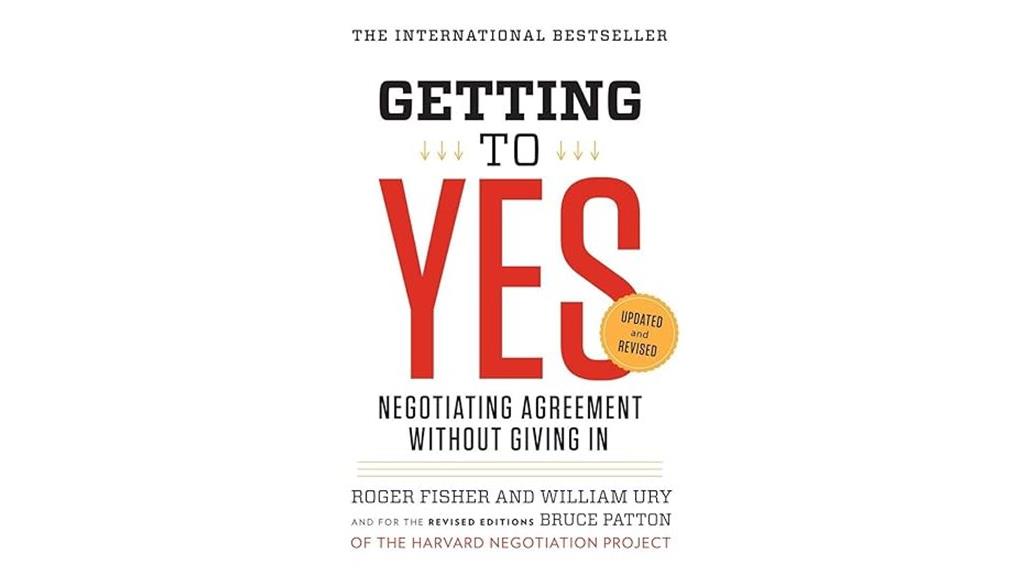
If you’re looking for a foundational book to improve your negotiation skills, especially if you’re new to the topic or want a clear, practical guide, “Getting to Yes” by Fisher and Ury is an excellent choice. I found it incredibly impactful and easy to understand, emphasizing respect, fairness, and problem-solving over tricks or manipulation. The book teaches you to focus on interests rather than positions, generate win-win options, and separate people from problems. Its straightforward style and real-life examples make it accessible and applicable to everyday situations, from business deals to personal conflicts. This book truly transforms how you approach negotiations, making them more effective and relationship-preserving.
Best For: individuals seeking a clear, practical introduction to negotiation skills to improve both personal and professional relationships.
Pros:
- Offers straightforward, easy-to-understand principles with real-life examples.
- Emphasizes respect, fairness, and problem-solving over manipulation or tricks.
- Applicable to a wide range of scenarios from business to everyday life.
Cons:
- The layout isn’t optimized for quick reference, lacking visual summaries or charts.
- Some readers may find the last 50 pages repetitive or less engaging.
- Requires discipline and practice to effectively apply its principles in real situations.
Never Split the Difference: Negotiating as if Your Life Depended on It
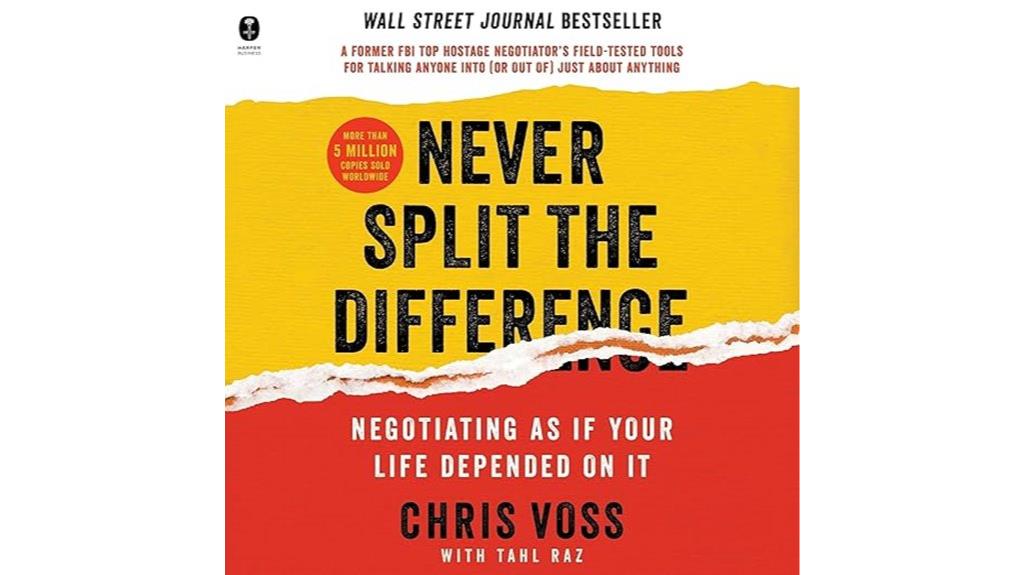
*Never Split the Difference* stands out as a must-read for professionals and negotiators who want to elevate their skills through proven, high-stakes strategies. Chris Voss, a former FBI hostage negotiator, shares techniques rooted in emotional intelligence and real-world crises. The book emphasizes listening, validation, and strategic questioning over traditional rational approaches. I found its methods practical and immediately applicable, especially in high-pressure scenarios. Voss’s stories make the concepts memorable, and his advice on managing emotions and gaining control resonated deeply. This book transformed my view of influence, showing that understanding human emotions is the key to successful negotiation every time.
Best For: professionals, managers, salespeople, and anyone seeking to enhance their negotiation and influence skills through emotionally intelligent strategies.
Pros:
- Offers practical, real-world negotiation techniques rooted in high-stakes scenarios
- Emphasizes emotional intelligence, improving rapport and conflict resolution
- Engaging storytelling with memorable anecdotes enhances understanding and retention
Cons:
- Some methods may feel manipulative or intense for casual or low-stakes situations
- Heavy reliance on anecdotes may lack extensive empirical validation
- Techniques require conscious effort and practice to implement effectively
The Next Conversation: Argue Less, Talk More

This section, “The Next Conversation: Argue Less, Talk More,” is especially valuable for anyone who wants to improve their communication skills by fostering connection rather than conflict. The book emphasizes that winning arguments weakens bonds, so focusing on understanding emotions builds stronger relationships. Techniques like breathing and patience help manage frustration and rudeness, allowing for thoughtful responses. Genuine listening, not just speaking, is key. By setting boundaries respectfully and approaching conversations with empathy, you can prevent escalation and create more meaningful connections. Fisher’s approach encourages a calm, sensitive style that promotes understanding—transforming difficult interactions into opportunities for genuine conversation.
Best For: anyone looking to enhance their communication skills by fostering connection, reducing conflict, and building stronger relationships in personal or professional settings.
Pros:
- Provides practical, actionable strategies rooted in real-world experience.
- Emphasizes empathy, patience, and respectful boundaries for healthier interactions.
- Combines relatable storytelling with clear, logical advice making complex concepts accessible.
Cons:
- May require consistent effort and self-awareness to see long-term improvements.
- Some readers might find it less focused on high-stakes or highly emotional conflicts.
- The approach may need adaptation for highly contentious or deeply ingrained disagreements.
Negotiation Genius Book on Overcoming Obstacles and Achieving Results
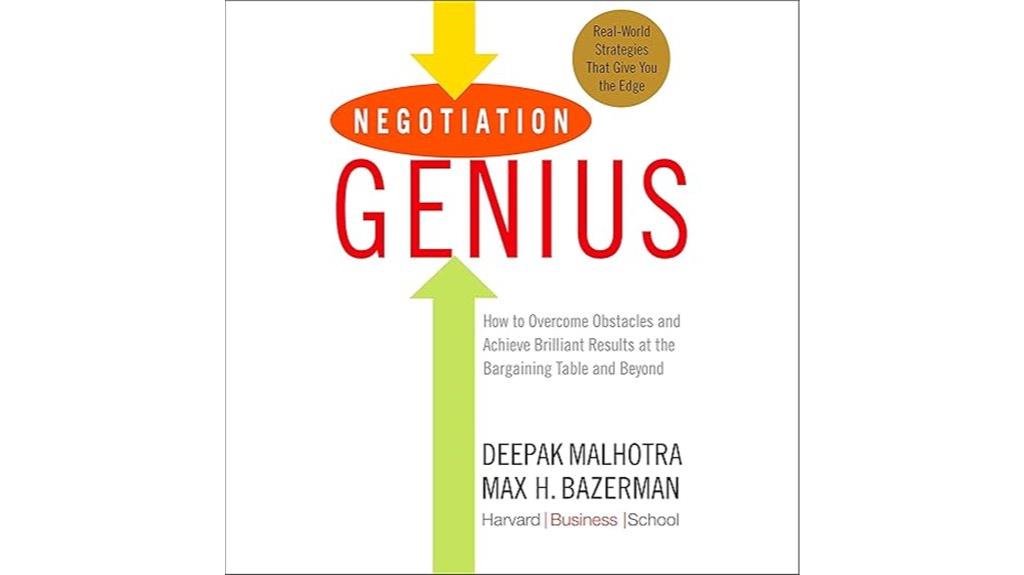
Negotiation Genius stands out as an essential resource for professionals and individuals new to negotiation who want to overcome obstacles and achieve better results. The book combines clear principles with real-world examples, making complex tactics accessible and practical. It emphasizes thorough preparation, understanding both sides’ interests, and building trust to create value. Many readers find its insights boost confidence, reduce stress, and improve outcomes across various scenarios, from business deals to personal negotiations. Its ethical approach and focus on ongoing relationships make it especially valuable. Overall, Negotiation Genius provides actionable strategies that help you navigate challenges and reach your goals more effectively.
Best For: professionals and individuals new to negotiation seeking practical strategies to overcome obstacles, build trust, and achieve better results in various negotiation scenarios.
Pros:
- Clear, accessible presentation combining theory and real-world examples
- Focuses on ethical, relationship-oriented negotiation strategies
- Enhances confidence and reduces stress in negotiations
Cons:
- Dense material may require multiple readings for mastery
- The comprehensive approach might be overwhelming for beginners
- Less emphasis on high-stakes or highly complex negotiations
Supercommunicators: How to Unlock the Secret Language of Connection
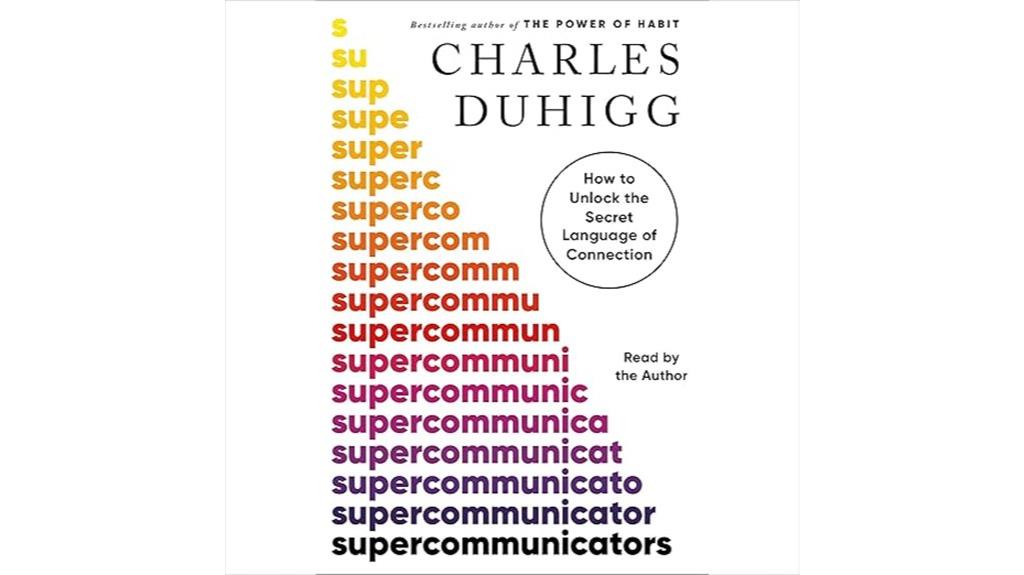
Are you looking to deepen your connections and communicate with greater authenticity? “Supercommunicators” shows that effective communication blends verbal and non-verbal cues, emphasizing empathy, active listening, and genuine expression. The book offers practical strategies and real-world examples to strengthen relationships in both personal and professional contexts. It highlights that communication is a skill you can learn and refine, helping you navigate social identities, reduce stereotypes, and foster resilience. Using metaphors like layers and dimensions, it reveals how understanding the complexity of identities enhances connection. Mastering these concepts disclose the secret language of connection, making your interactions more meaningful and impactful.
Best For: individuals seeking to enhance their communication skills, deepen personal relationships, and foster genuine social connections in both personal and professional settings.
Pros:
- Offers practical strategies and real-world examples for effective communication.
- Emphasizes the importance of empathy, active listening, and authenticity.
- Uses engaging metaphors like layers and dimensions to simplify complex concepts of identity and connection.
Cons:
- May require time and effort to consistently apply the techniques in everyday interactions.
- Some readers might find the metaphors abstract or challenging to fully grasp initially.
- The focus on social identities and stereotypes might not address all cultural or contextual nuances.
Bargaining for Advantage: Negotiation Strategies for Reasonable People
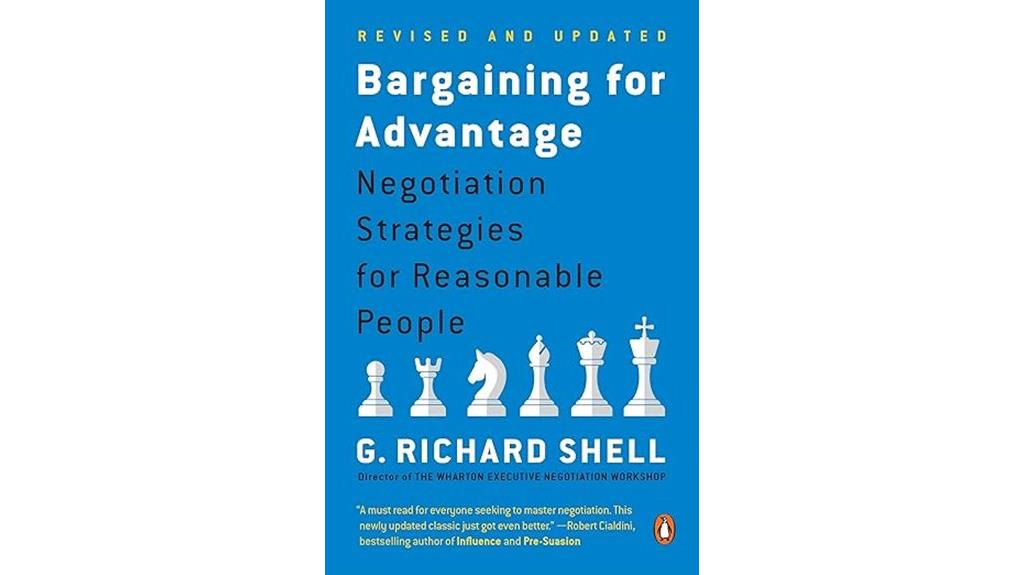
If you’re looking to build a solid foundation in negotiation, Bargaining for Advantage by Richard Shell offers practical strategies tailored for reasonable people seeking mutually beneficial outcomes. The book breaks down negotiation principles, highlighting real-world examples from billion-dollar deals to everyday situations. Shell introduces six bargaining styles, helping you identify your approach and choose effective tactics. It emphasizes understanding leverage, ethical boundaries, and logical reasoning. Whether dealing with a boss, client, or family member, the book teaches you how to negotiate confidently, focusing on mutual gains. It’s an accessible, actionable guide that improves your strategic thinking and negotiation skills from the first read.
Best For: individuals seeking practical, ethical negotiation strategies to improve their confidence and effectiveness in personal and professional settings.
Pros:
- Provides clear, real-world examples that enhance understanding and application of negotiation principles
- Introduces six bargaining styles to help readers identify and adapt their approach
- Emphasizes logical reasoning and mutual gains, fostering ethical and mutually beneficial negotiations
Cons:
- May require supplementary resources for a comprehensive understanding of complex negotiation tactics
- Focuses primarily on reasonable, ethical negotiation styles, potentially overlooking aggressive or manipulative tactics
- Some readers might find the emphasis on mutual gains less applicable in highly competitive or adversarial negotiations
Negotiating for Success: Essential Strategies and Skills
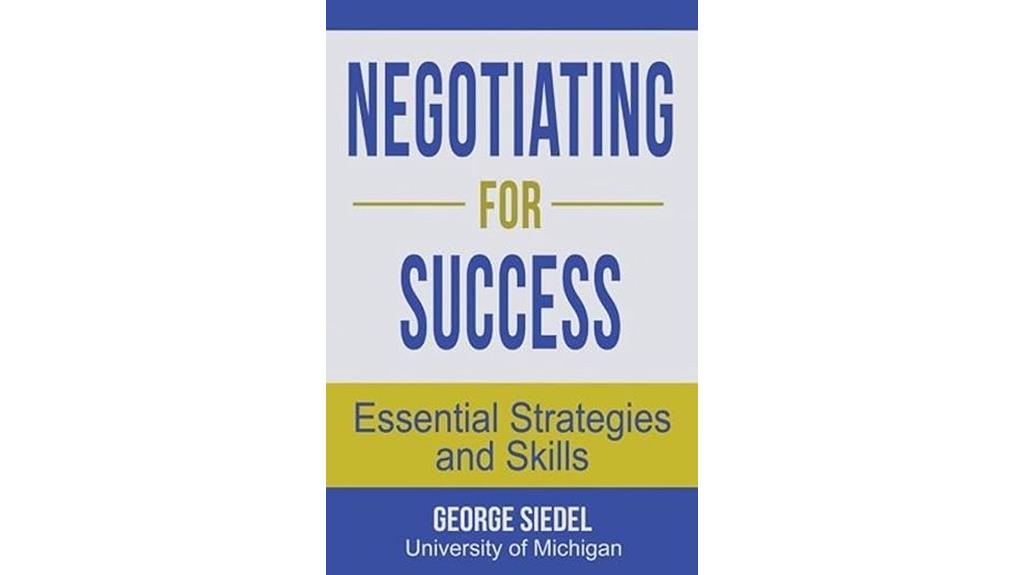
For professionals and students enthusiastic to build practical negotiation skills, “Negotiating for Success” by Professor Siedel stands out as an essential resource. The book offers a clear, step-by-step approach covering preparation, tactics, closing, and the end game, supported by checklists and case studies. Its focus on principled, integrative negotiation encourages expanding the pie and developing skills beyond simple tactics. Easy to understand with concrete examples, it’s perfect for beginners and experienced negotiators alike. When paired with Professor Siedel’s free online course, it provides a thorough, practical framework that boosts confidence, strategic thinking, and negotiation outcomes.
Best For: professionals, students, and anyone seeking practical, confidence-boosting negotiation skills applicable across various contexts.
Pros:
- Clear, step-by-step structure makes complex concepts accessible
- Practical checklists, case studies, and frameworks enhance real-world application
- Complements a free online course for a comprehensive learning experience
Cons:
- Some may find negotiation to be more art than science, requiring additional practice
- Focus mostly on foundational skills, less on advanced or highly specialized tactics
- Text-to-speech and digital features, while helpful, may not substitute in-depth interactive learning
Negotiation Made Simple: A Practical Guide
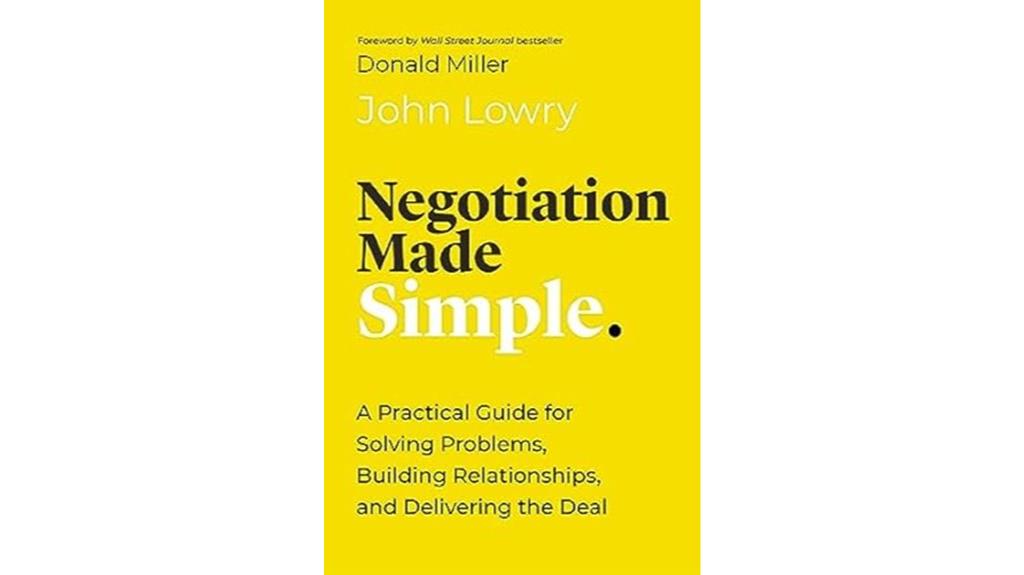
“Negotiation Made Simple” by John Lowry stands out as an ideal guide for anyone seeking practical, easy-to-understand strategies to improve their negotiation skills. I appreciate how Lowry breaks down negotiation into clear, manageable parts—decision-making, process management, and deal closing—making complex concepts accessible. The book’s real-world examples and exercises help me immediately apply what I learn, whether negotiating a deal or resolving a conflict. I’ve found that his approachable style builds confidence and turns negotiation into a structured, strategic process. This book is a valuable resource for anyone wanting to negotiate more effectively in both professional and personal settings.
Best For: individuals seeking practical, straightforward strategies to enhance their negotiation skills in both personal and professional contexts.
Pros:
- Clear, easy-to-follow methodology suitable for novices and experienced negotiators alike
- Incorporates real-world examples and exercises for immediate application
- Builds confidence by turning negotiation into a structured, strategic process
Cons:
- May oversimplify complex negotiation scenarios for advanced practitioners
- Focuses primarily on foundational techniques, offering limited coverage of highly sophisticated strategies
- Some readers might desire more in-depth case studies or advanced tactics
The Negotiation Blueprint: Proven Tactics for Securing Contract Deals
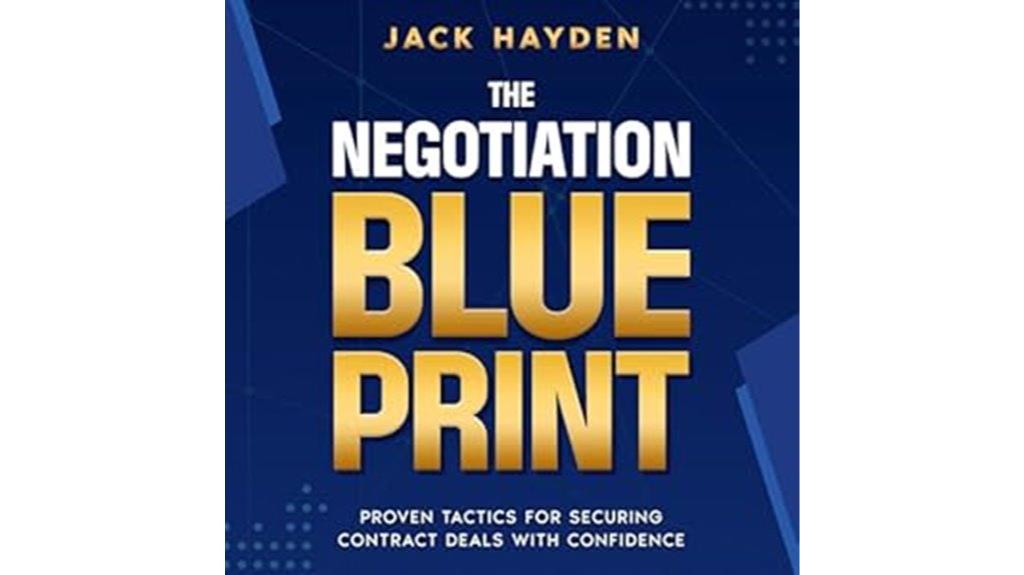
The Negotiation Blueprint stands out as an essential resource for project managers, beginners, and seasoned professionals aiming to close contract deals successfully. It offers a clear, step-by-step approach covering preparation, information exchange, bargaining, and closing. The book emphasizes the importance of setting goals, maintaining communication, and understanding power dynamics. With seven proven tactics, it helps navigate complex legal language, create win-win scenarios, and handle tough negotiations. Plus, it explores legal clauses, contractual risks, and modern tools like AI and collaboration platforms. This practical guide boosts confidence and strategic thinking, making it indispensable for anyone serious about mastering contract negotiations.
Best For: project managers, beginners, and experienced professionals seeking practical strategies to successfully negotiate large-scale contracts and legal agreements.
Pros:
- Provides a clear, step-by-step negotiation process suitable for all experience levels
- Includes comprehensive legal terminology and risk management guidance for complex contracts
- Offers insights into modern tools like AI and collaboration platforms to streamline negotiations
Cons:
- May require additional legal expertise for fully understanding complex clauses
- Focuses primarily on large-scale and government contracts, which might limit applicability for smaller deals
- Some readers might find the detailed legal and technical content dense without prior background
The First Minute: How to Start Conversations That Get Results
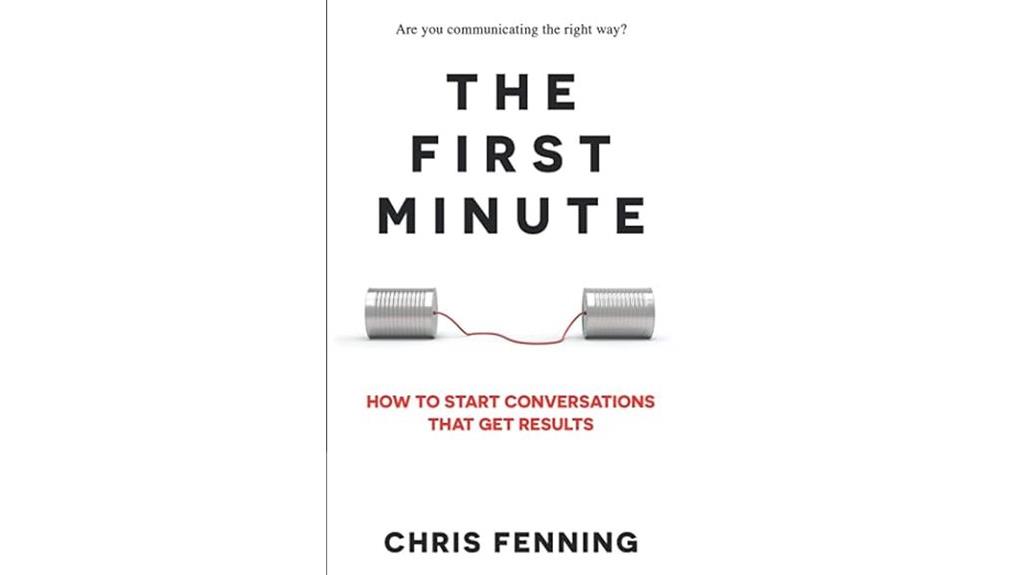
Are you looking to make a strong impression right from the start of a conversation? I’ve found that mastering those first moments can dramatically impact your results. This book offers simple, actionable strategies to begin conversations confidently, whether via email or face-to-face. It emphasizes being clear, concise, and direct—key to capturing attention in today’s fast-paced world. With a straightforward three-step process, it helps you identify issues and communicate effectively from the get-go. While primarily focused on workplace interactions, the techniques can be adapted to various scenarios, making every first impression count and setting the stage for successful negotiations.
Best For: professionals seeking to improve their workplace communication, especially in email or initial face-to-face interactions, to make impactful first impressions and enhance career prospects.
Pros:
- Provides clear, actionable frameworks that are easy to implement immediately
- Focuses on concise, direct communication, saving time and increasing effectiveness
- Includes relatable real-life examples that help contextualize concepts
Cons:
- Some parts can feel repetitive and could benefit from further condensation
- Primarily centered on email communication, with less emphasis on spontaneous in-person conversations
- Redirects to external resources, which may be unnecessary for some readers
Advanced Negotiation and Mediation Coursebook
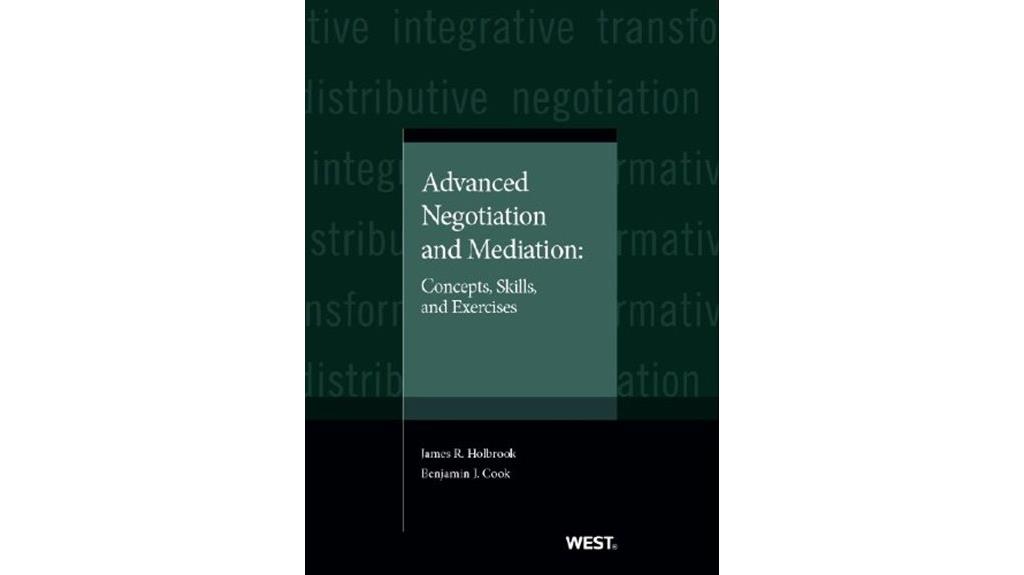
If you’re a law student or a professional working in negotiation and mediation, the Advanced Negotiation and Mediation Coursebook offers a highly focused resource tailored to your needs. It’s concise yet exhaustive, emphasizing practical exercises and systematic analysis of conflict dynamics. The book covers the origins of disputes, various resolution approaches, and key techniques like reciprocity and mediation ethics. Its honest, psychologically dense content deepens your understanding of conflict behavior, making complex concepts accessible. Perfect for those seeking an in-depth, applied understanding of advanced negotiation strategies, this coursebook is an essential tool for sharpening your skills and steering through complex conflicts effectively.
Best For: law students and professionals seeking an in-depth, practical guide to advanced negotiation and mediation techniques.
Pros:
- Concise yet comprehensive, avoiding unnecessary verbosity.
- Emphasizes practical exercises and systematic conflict analysis.
- Deepens understanding of psychological dynamics and ethical considerations.
Cons:
- May be too specialized for casual or introductory readers.
- Requires some background knowledge of negotiation and mediation concepts.
- The dense psychological content could be challenging for those new to conflict theory.
Factors to Consider When Choosing Negotiation Skill Books

When selecting a negotiation book, I focus on the author’s credibility and expertise to guarantee I’m learning from a trusted source. I also consider whether the content is practical and easy to apply, as well as if it matches my skill level and goals. Additionally, I look for books that offer useful supplementary resources to deepen my understanding and practice.
Author Credibility and Expertise
Choosing a negotiation book supported by credible authors guarantees you’re learning from proven experts. When evaluating authors, consider their professional background—former negotiators, academics, or industry leaders bring valuable practical insights. Credentials like advanced degrees, certifications, or research contributions signal deep expertise and commitment to the field. Authors with real-world experience, such as FBI hostage negotiators or successful entrepreneurs, often share actionable strategies rooted in practice. Recognized writers who’ve published multiple influential books or are frequently cited in academic and professional circles demonstrate authority. Additionally, credible authors back their advice with evidence, case studies, or references to established negotiation principles, which enhances trustworthiness. Selecting books authored by such experts ensures you’re gaining reliable, well-founded knowledge to sharpen your negotiation skills.
Practical Application Focus
Selecting a negotiation book backed by credible authors guarantees you’re learning from true experts, but practical application is what turns knowledge into skill. Look for books that include exercises, case studies, or real-world examples to reinforce learning through action. Prioritize titles offering step-by-step frameworks or checklists, making it easier to implement techniques immediately. Choose resources that emphasize adaptable strategies suitable for various situations—business, personal, or high-stakes deals. Clear, actionable tips with concise instructions allow for quick application without extensive prior experience. Additionally, opt for materials that provide tools to evaluate and reflect on your negotiation style and progress, ensuring continuous improvement. Practical focus transforms theoretical knowledge into real-world competence, making your negotiation skills more effective and confident.
Content Depth and Clarity
Content depth and clarity are essential factors that can make or break your learning experience from a negotiation book. A clear, straightforward explanation tailored to your current understanding helps you grasp fundamental concepts without confusion. Equally important is finding content that offers enough depth to challenge your skills—balancing foundational knowledge with more advanced strategies—so you stay engaged without feeling overwhelmed. Well-structured information, including summaries, frameworks, or visual aids, enhances comprehension and retention, especially for complex ideas. It’s also imperative that the book distinguishes clearly between core principles, tactical techniques, and ethical considerations, providing a thorough view. Finally, accessible language and relatable examples make learning engaging and effective, ensuring you can apply concepts confidently in real-world situations.
Target Audience Relevance
When picking a negotiation book, it’s important to guarantee its focus aligns with your current skill level and goals. Make sure the book is tailored for beginners, intermediates, or advanced negotiators, so you get relevant insights. Think about your specific context—are you negotiating in business, legal, personal, or high-stakes situations? The right book should match your professional background or personal ambitions, making its lessons more applicable. Check if it offers practical exercises or case studies that suit your learning style, whether you prefer hands-on practice or theoretical understanding. Finally, assess if the language and complexity are appropriate for your familiarity with negotiation concepts, ensuring you can easily grasp and apply the strategies for maximum benefit.
Supplementary Resources Offered
Many negotiation books now include supplementary resources like online courses, checklists, and case studies to enhance your learning experience. These tools make it easier to apply concepts by offering practical, step-by-step guidance. For example, checklists and templates help you implement techniques confidently, while case studies provide real-world examples that deepen understanding. Some books also offer access to webinars, videos, or podcasts, which reinforce lessons through diverse formats. Additionally, online communities or forums connected to the books allow you to discuss strategies and share insights with peers, fostering continuous growth. Referencing expert interviews or research within the materials adds credibility and broadens your perspective. Overall, these resources considerably boost your ability to master negotiation skills effectively.
Frequently Asked Questions
Which Book Best Suits Beginner Negotiators?
You’re asking which book is best for beginner negotiators. I recommend starting with “Getting to Yes” by Fisher and Ury. It breaks down fundamental negotiation principles clearly and practically, making it perfect for newcomers. The book emphasizes mutual gains and effective communication, helping you build confidence and skills early on. Honestly, it’s a timeless resource that laid the foundation for many successful negotiators, including myself.
How Do These Books Address Cultural Differences in Negotiation?
Did you know that 70% of international negotiations succeed when cultural differences are understood? These books often highlight the importance of cultural awareness by sharing real-world examples and strategies. They teach you to recognize non-verbal cues, adapt your approach, and build rapport across cultures. I find this especially helpful because understanding cultural nuances boosts confidence and effectiveness, making negotiations smoother and more successful.
Are There Recommended Books for Online or Virtual Negotiations?
You’re asking about books on online or virtual negotiations. I recommend titles like “Virtual Negotiation” by David A. Lax and “The Surprising Power of Online Negotiation” by Jennifer E. Salo. These books cover strategies tailored for digital settings, including managing technology, building rapport remotely, and overcoming the unique challenges of virtual communication. They’re practical guides that help you succeed in today’s increasingly digital negotiation landscape.
Do These Books Include Real-World Case Studies?
Imagine a navigational chart guiding a sailor through unpredictable waters—that’s how these books approach negotiation. They do include real-world case studies, acting like landmarks to help you steer through complex scenarios. These stories ground theories in reality, making lessons more practical. So, whether you’re negotiating online or face-to-face, you’ll find concrete examples to sharpen your skills and navigate confidently in any situation.
How Frequently Should I Revisit These Books to Improve Skills?
I believe revisiting these books regularly is key to honing my negotiation skills. I try to review them every few months, especially after applying new techniques or facing challenging situations. This keeps the concepts fresh and helps me refine my approach. By consistently revisiting the material, I stay sharp and adapt my strategies, ensuring continuous improvement in my negotiations. It’s a habit that really pays off over time.
Conclusion
Mastering negotiation can markedly boost your success—did you know that 85% of job success comes from effective communication and negotiation skills? By exploring these top books, you’ll gain practical strategies backed by experts to navigate any deal confidently. Remember, the key isn’t just talking but truly understanding and connecting with others. Start your journey today, and watch how your ability to negotiate transforms your personal and professional life.











